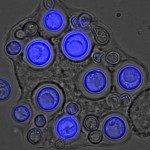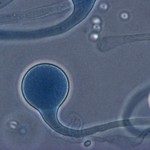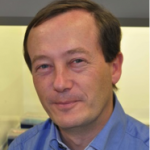Lien vers Pubmed [PMID] – 32577733
Lien DOI – 10.1093/mmy/myaa051
Med Mycol 2021 Mar; 59(3): 266-277
Though candidiasis is the most frequent invasive fungal infection, Candida spp. central nervous system (CNS) infections are rare but severe. To further describe clinico-patho-radiological presentations of this entity, we report a retrospective study from January 2005 to December 2018 including patients aged ≥ 28 days with proven or probable CNS candidiasis in France. Twenty-four patients were included. Seventeen patients (70%) had CNS localization secondary to disseminated candidiasis (10 with hematologic malignancies [HM]; the seven other patients had infective endocarditis [IE]). Among patients with HM, seven previously had lumbar puncture for intrathecal chemotherapy, the three others had IE. Among patients with disseminated infection, magnetic resonance imaging (MRI) evidenced meningitis (17%), micro-abscesses (58%), or vascular complications (67%). Seven patients (30%) had isolated CNS involvement related to neurosurgery (n = 2), CARD9 deficiency (n = 2), intravenous drug use, diabetes mellitus, or no identified predisposing condition (n = 1 each). All evaluated patients with isolated CNS involvement had meningitis on cerebrospinal fluid (CSF) and intracranial hypertension. For the latter patients, MRI evidenced meningitis (71%) or abscesses (57%). Among all patients, cerebrospinal fluid (CSF) culture grew Candida spp. in 31% of cases. CSF βDGlucan or mannan Ag were positive in respectively 86% and 80% of cases. Mortality attributed to CNS candidiasis was 42%: 53% in case of disseminated infection (70% for HM) and 14% in case of localized infection. CNS candidiasis are isolated or occur during disseminated infection in patients with HM and lumbar puncture for intrathecal chemotherapy or during IE. Clinical, radiological finding and outcome highly vary according to CNS localized versus disseminated candidiasis.Candida is a yeast and is the most common cause of fungal infections worldwide. Candida central nervous system (CNS) infections are rare, severe, and poorly described. We report a retrospective study from January 2005 to December 2018 including patients aged ≥ 28 days with proven or probable CNS candidiasis in France. Twenty-four patients were included (14 men, median age 51 years). Seventeen patients had CNS localization secondary to disseminated candidiasis from blood to CNS (10 with hematologic malignancies [HM], the seven other patients had infective endocarditis [IE]). Seven patients had isolated CNS involvement related to neurosurgery (n = 2), CARD9 deficiency (n = 2), intravenous drug use (n = 1), diabetes mellitus (n = 1), or no identified risk factor (n = 1).During Candida CNS infections, brain lesions were meningitis abscesses or vascular complications. Cerebrospinal fluid (CSF) culture grew Candida spp. in 31% of cases. Forty-two percent of patients died from infection: 53% in case of disseminated infection (70% for HM) and 14% in case of localized infection.




